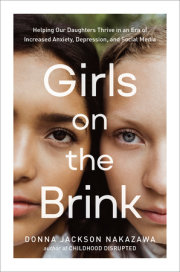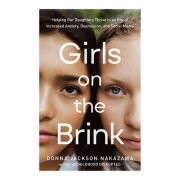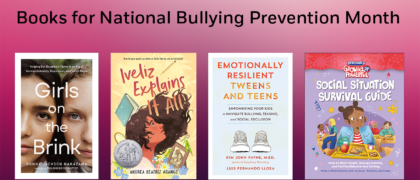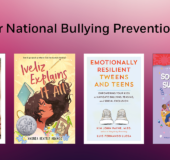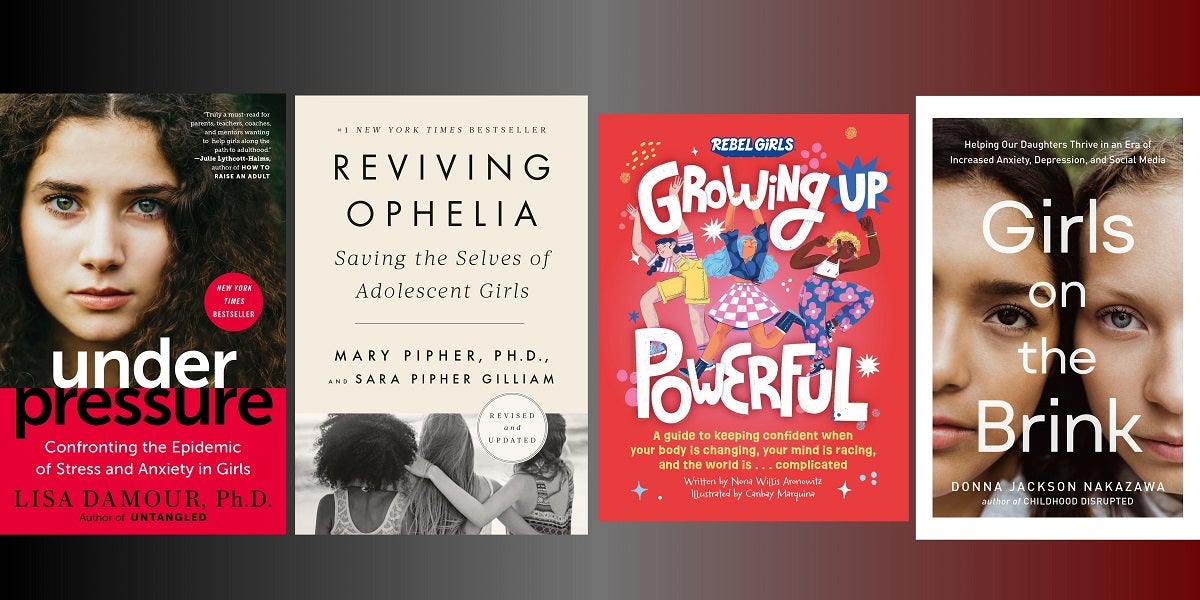CHAPTER ONE
Our Girls Are Not Okay Why Are So Many of Our Daughters Struggling? Anna Moralis keeps a portrait of her maternal grandmother on her desk in her small Chicago student apartment. Her resemblance to her grandmother is striking—they share large dark eyes, chestnut hair, and a narrow chin. “Just seeing my grandmother smiling at me helps bring down my anxiety levels,” Anna tells me when we meet for the first time. As we talk, Anna leans over a sketchbook and doodles with colored pencils. I wonder if drawing also helps her manage her anxiety.
Anna, who has just turned twenty-one and has a clear sense of herself gained through time and talk therapy, plans to go to law school and focus on social justice. But even when she was young—indeed, by the time she was twelve—she was politically engaged and reflective about the world. “I begged my parents to take me to human rights marches,” she tells me. “Everywhere I looked, there was so much social and environmental injustice. Racism, voting rights, terrorism, global warming, climate change, spates of school shootings. On the one hand, I found a lot of confidence by being so engaged; I wrote op-eds for my middle school newspaper and sold candy bars to raise money for kids caught in the Middle East conflict.” But immersing herself in larger social issues also made her feel as if “the little things I was going through in my own teenage life couldn’t be valid. I had this sense that it was silly for me to be upset about anything happening in my personal life.”
Toward the end of middle school, “I became popular for the first time,” Anna recalls. “Then social media took over. Social media was terrible for me. I already had a lot of discomfort with my body image. So much of social media is imbued with this constant, pervasive sexism.” That year in middle school, “a lot of girls would get together to watch TV shows like
Pretty Little Liars, in which perfect-looking twentysome-things played perfect-looking sixteen-year-olds. They had
Victoria’s Secret Fashion Show–viewing parties and posted pictures of themselves on Snapchat trying to look sexually mature and model perfect. That wasn’t good for me or for my self-image.”
When Anna turned fourteen and entered high school, the social scene grew far more challenging. “The friends I’d had in middle school dropped me. They said I was ‘too nice’ and my concern for social justice was ‘fake’; that I was trying to get attention. I couldn’t make new friends because my magnet school was so tiny.” Anna’s precocious self-awareness became a double-edged sword. As her peers made fun of her, she began to turn her capacity for observation and reflection against herself. “I had this sense that if I were skinnier or prettier or happier or less serious, I’d be included in the things everyone posted about on Snapchat and Finsta,” she says, referring to the private accounts teens use to share inside jokes and gossip with a restricted group of peers. “Maybe I’d even have a boyfriend. I assumed there was something missing in me and that was the reason I was missing out.”
Using the language for self-reflection that comes with therapy, Anna sees, looking back, how “the role models imposed by the world around me for how to be female were bombarding me from screens, phones, computers, TV, which everyone my age was on six or seven hours a day. The screen version of the feminine ideal overshadowed real life. I never got to choose how
I wanted to be as a female teen.”
Anna’s mother, a physician with the U.S. Army Medical Corps, was stationed overseas. “I felt very alone. I told myself,
Oh, so what if I don’t have friends? It’s not that bad; it could be worse. I wasn’t suffering from atrocities—there was no war or school shooting or flood or fire on my own doorstep—so how could my own sadness be valid? But inside, my depression snowballed. I didn’t understand what I was so sad and fearful about. We didn’t even have the pandemic! It was more like a pandemic of a growing feeling of unsafety about everything, everywhere I turned.”
Anna began restricting her meals to tiny portions. These periods were followed by binge eating. “When I was fourteen, I gained fifteen pounds. My mom came home on leave, and one day while my parents and I were driving, I was sitting in the back seat and they said, ‘Anna, you’ve gained weight. We’re worried about it. We wanted to talk to you about eating less and signing up for an exercise class.’ They didn’t seem to notice that I was also no longer my bubbly self. . . . On the one hand, my parents supported who I was on the inside—they told me I was a really good writer and would be an amazing novelist one day—but I was also living in this larger, toxic soup of damaging, gendered messages about being female, and that led me to process everything I heard them say in a toxic way, especially when it came to messages about my body:
You are less than if you are fat. If you are fat, even the people who love you aren’t going to accept you for who you are.” This added to Anna’s “pervasive sense of invalidation, of not feeling seen for who I was and what I was going through.” And that contributed to a “vicious cycle of eating and purging.”
Academic stress, meanwhile, snowballed. “I was in a competitive magnet school. I’d be at school seven hours a day, totally stressed because I knew I had to do well to get the accolades of top grades and college acceptances, and totally bored by the endless work teachers assigned. When I was fifteen, sixteen, and seventeen, I spent every free minute doing activities or homework until midnight. I’d spend all weekend doing more homework. Even though my school talked about valuing ‘learning’ over awards, that was just not true. It was all about getting the accolades.”
Anna’s mother took a second tour overseas. Anna was at home with her dad and her elder sister and brother. Her sister, several years her senior, went off to college. “Suddenly, I was the only girl in my house. I often felt that when there were family arguments, I was somehow the one who’d said or done something wrong. My dad could be very patronizing. And that would lead to explosive clashes between us. He’d say something condescending, and I’d slam my door and stay in my room. It was always made out to be my fault; I was always the one who got the blame for all this ridiculous, constant anger simmering in our household, and [I] had to apologize. My brother clammed up. My dad got so fed up with single parenting, he completely disengaged. I started going out and drinking a lot with this one friend I had. I started eating a ton. When I think back to that time, I can see I felt this overwhelming sense of female powerlessness, coupled with a sense of just being abandoned. I had no female mentors, and my family felt ruptured. We’d always had this very loving family when I was a kid—but suddenly, that was gone. My mom and I would talk on Skype a lot, but there was no one I could turn to to help me process life as a teenage girl in a pretty f***ed-up world.”
Throughout the rest of high school, Anna put forth the appearance that all was okay—that she was okay. She was eighteen when she left for college, carefully concealing her mounting sense of melancholy and unease. It was then that things fell apart. It was as if she had buried all her fears and sorrow and sense of dejection in some bottomless black hole inside her, and now the hole had become so large that it had swallowed her, too, until she could no longer find herself within it.
Copyright © 2022 by Donna Jackson Nakazawa. All rights reserved. No part of this excerpt may be reproduced or reprinted without permission in writing from the publisher.



